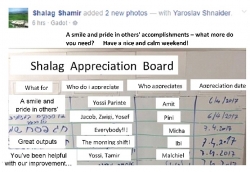This article references the book The One Minute Manager, by Ken Blanchard and Spencer Johnson.
When you get into a cab, the first question the driver asks you is - where are you going? You probably always have an answer to that. After all, you wouldn't get in a cab without a destination in mind.
Yet I meet people, and even businesses, with no goals. And without goals, you can’t have purposeful progress.
I’m not just talking about small business owners, the kind that keeps business and personal funds together. I’ve met companies that not only operate with no goals, but where the owners don’t even monitor the company’s profits or balance.
Without a goal and work plan, without even knowing if your business is making or losing money, how can a business grow, or even survive in the current ever-changing economic reality?
The CEO Has a Goal: Show Profits. What about Those below Him?
Usually, CEOs have goals. At the very least they need to show profit. Never mind growth or development. The CEO is monitored by the board at least once a quarter, when they look at profits. If the CEO is also the owner, then the bank does the monitoring.
What happens below the CEO? Does every manager have a measurable goal? Most often, managers and executives have no set goals, and their progress isn’t monitored. This is even the case with VPs.
A survey we conducted on this site showed less than 30% (!!!) reported a culture of working with goals and KPIs in their company, even for the VPs, or that VPs report monthly on their progress and need to have concrete plans to improve.
How can managers have work plans if they don’t have goals? Or if they have set goals, but those aren't measured or monitored?
Would the CEO or VPs get in a cab with no destination in mind? And as the answer to this rhetorical question is No, why do so many managers come to work every day with no defined goal?
Do they only have a list of tasks they made for themselves, or that their manager set for them? And how is that list determined?
Setting Goals is the First Secret, and the Basis of the One Minute Manager Method
In their book The One Minute Manager, Ken Blanchard and Spencer Johnson present goal setting as the first secret. According to Blanchard and Johnson, in most companies, when employees are asked what they do, they give very different answers than their managers. Without clear direction from managers, employees often act according to what they perceive their job to be, but not according to their managers’ expectations. They also write that the 20-80 rule applies for goal setting too: 80% of results come from 20% of goals. So you should identify those 20% and set goals only for them - usually three to six issues.
What Are You Accountable For?
Uzi Granot was Board Chair in my second job as CEO. He was an exceptional man, and had a unique organizational perspective.
He asked me what I’m accountable for. Not whom I’m in charge of, but to what results I’m committed.
As CEO, my first goal was to show profits. Uzi showed me a short and precise job description template:
- What is your title?
- Who do you report to (or who is your manager)?
- Which results are you accountable for? Or as Uzi put it: what will I hang you for?
- What authority do you need to do your job?
- What are your measurable goals?
While in my experience this idea is popular in theory, in practice I encounter great resistance to setting goals and KPIs.
Managers Make a Mistake When They Hesitate to Set Goals
Over the years, especially after I started consulting, I’ve found that sometimes there isn’t agreement on questions like “who’s your manager?” or “who do you report to?”.
Furthermore, I rarely get an answer To the question “what results are you committed to and what are your goals?”. I’ve even encountered resistance to simply discussing this. It seemed to me managers were afraid of defining goals.
This might seem natural: if I’m being monitored, then I’m being tested. And no one wants to be under a microscope.
But at work, we are always monitored, and even if at times managers don’t give explicit feedback, once a crisis hits, like the current pandemic, the weak will always be the first to pay the price and be let go.
The question is, how am I being evaluated? Do my managers and I agree on the criteria? An employee can work very hard and with great dedication, and not be appreciated. Simply because the work delivered isn’t the work the manager expects to get.
After talking about how there is often a difference between how an employee sees their job and how the manager does, The One Minute Manager goes on to assert that when there are clear goals set, this problem is avoided. There are no surprises or unspoken expectations.
Is this phenomenon familiar to you?
Setting Goals Gets Everyone Focused on Company Goals
As I wrote above, the CEO usually has set goals (usually generating profits, guaranteeing the company’s resilience, and leading developments). But CEOs can’t achieve these goals alone. They must get the entire organization invested and engaged. When a CEO sets goals with the VPs, and they in turn do the same with their reports and so on - it’s possible to focus everyone’s goals so that they support the company's goals.
In my experience, three to four goals is the maximum you should assign each manager. Beyond that they might lose focus.
A job definition, as presented above, has several other advantages other than goal setting. In every company where I’ve seen the CEO define roles as above, and where roles and responsibilities were discussed by management - all the grey areas that no one took responsibility for got “filled”, and areas for which multiple people took responsibility were sorted. This way, too, disagreements among management lessened, if there were any.
It’s Not Enough to Set Goals - You Must Measure and Monitor
Setting goals without monitoring progress is tantamount to not setting goals at all. Managers at every level, including VPs, interpret a lack of monitoring as if their work isn’t valuable.
I’m sure if you look inwards, you’ll see where corner cutting begins. When we aren’t monitored and held accountable, we start cutting corners.
The CEO should monitor employees once a month, while other managers should monitor weekly, and at times, daily (for example, performance on the production floor).
Summary and Recommendations
Just as a taxi driver can only take us to our destination if we know what it is, so can we only achieve our goals if we have them. Setting and defining goals enables us to plan the way to achieve them.
And from the other direction, we can ask: if we have no goals, where are we heading? What is the direction of our progress?
I emphasize that setting goals and responsibilities allows us to make sure everyone is on the same page, and clears up misunderstandings and miscommunications.
I recommend you work with clearly defined roles, as shown above, and especially set measurable goals for every manager and employee, and monitor progress.
Focused and Fast Coaching and Consulting Services for CEOs and Companies during the Coronavirus Crisis
The Business Excellence team can help you build, within 2-4 working days, a plan to survive this financial crisis, or to achieve your goals, as we’ve explained in our first webinar from August 2020 [in Hebrew].
Our experts have a wide and diverse experience of over 100 years combined managing companies and consulting to CEOs – so we will be able to identify the unique needs of each company, and find the safest and fastest way for you to approach the new challenges presented by the crisis, and to ensure your company’s resilience.
If you are interested in my professional help, personally or for your company, the best way to contact me is to send a request through the Get in Touch form here.
Related Articles
- How Managers Can Use Personal Goals to Achieve Company Goals
- How to Promote Engagement and Get Employees Invested in Company Goals
- The Coronavirus Crisis is a Great Opportunity to Engage Employees with Company Goals
- Excellence, Quality, and Increased Profits through Employees' Involvement and Responsibility
- The CEO and Management: Division of Responsibilities and Authority in the Organization












 My First Book: Manage! Best Value Practices for Effective Management
My First Book: Manage! Best Value Practices for Effective Management